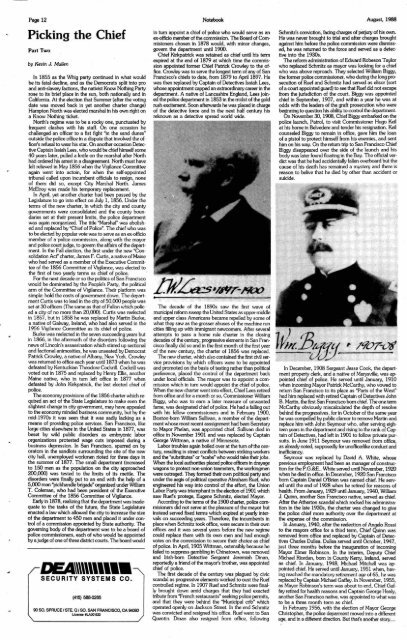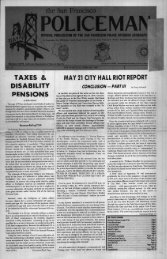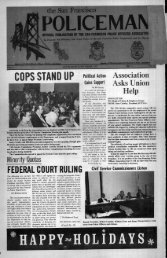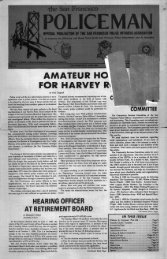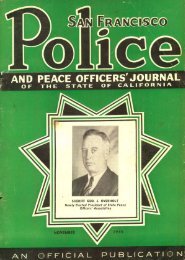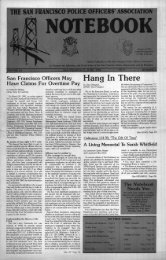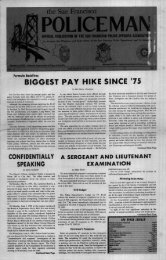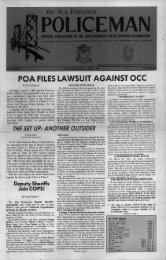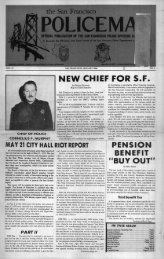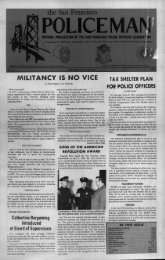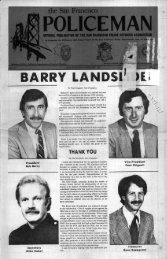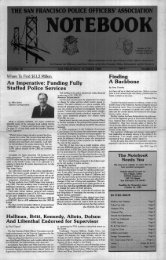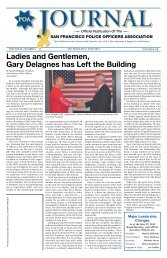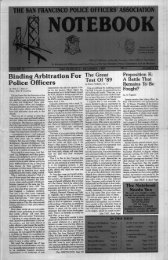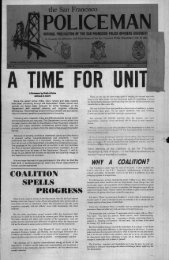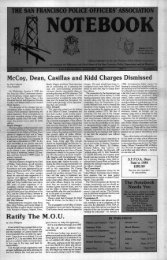August 1988 - San Francisco Police Officers Association
August 1988 - San Francisco Police Officers Association
August 1988 - San Francisco Police Officers Association
You also want an ePaper? Increase the reach of your titles
YUMPU automatically turns print PDFs into web optimized ePapers that Google loves.
Page 12 Notebook <strong>August</strong>, <strong>1988</strong><br />
Picking the Chief<br />
Part Two<br />
by Kevin J. Mullen<br />
In 1855 as the Whig party continued in what would<br />
be its fatal decline, and as the Democrats split into pro<br />
and anti-slavery factions; the nativist Know Nothing Party<br />
rose to its brief place in the sun, both nationally and in<br />
California. At the election that Summer (after the voting<br />
date was moved back in yet another charter change)<br />
Hampton North was elected marshal in his own right on<br />
a Know Nothing ticket.<br />
North's regime was to be a rocky one, punctuated by<br />
frequent clashes with his staff. On one occasion he<br />
challenged an officer to a fist fight "in the sand dunes"<br />
outside the police office in a dispute that involved the officer's<br />
refusal to wear his star. On another occasion Detective<br />
Captain Issiab Lees, who would be chief himself some<br />
40 years later, pulled a knife on the marshal after North<br />
had ordered his arrest in a disagreement. North must have<br />
felt relieved in May 1856 when the Vigilance Committee<br />
again went into actoin, for when the self-appointed<br />
tribunal called upon incumbent officials to resign, none<br />
of them did so, except City Marshal North. James<br />
McElroy was made his temporary replacement.<br />
In April, yet another charter had been passed by the<br />
Legislature to go into effect on July 1, 1856. Under the<br />
terms of the new charter, in which the city and county<br />
governments were consolidated and the county boundaries<br />
set at their present limits, the police department<br />
was again reorganized. The title "Marshal" was abolished<br />
and replaced by "Chief of <strong>Police</strong>". The chief who was<br />
to be elected by popular vote was to serve as an ex-officio<br />
member of aixlice commission, along with the mayor<br />
and police court judge, to govern the affairs of the department.<br />
In the Fall election, the first under the new "Consolidation<br />
Act" charter, James F. Curtis, a native of Maine<br />
who had served as a member of the Executive Committee<br />
of the 1856 Committee of Vigilance, was elected to<br />
the first of two yearly terms as chief of police.<br />
For the next decade or so the politics of <strong>San</strong> <strong>Francisco</strong><br />
would be dominated by the People's Party, the political<br />
arm of the Committee of Vigilance. Their platform was<br />
simple: hold the costs of government down. The department<br />
Curtis was to lead in the city of 50,000 people was<br />
set at 30 officers (The same as that of Fallon which policed<br />
a city of no more than 20,000). Curtis was reelected<br />
in 1857, but in 1858 he was replaced by Martin Burke,<br />
a native of Galway, Ireland, who had also served in the<br />
1956 Vigilance Committee as its chief of police.<br />
Burke was reelected in the seven succeeding years but<br />
in 1866, in the aftermath of the disorders following the<br />
news of Lincoln's assassination which stirred up sectional<br />
and factional animosities, he was unseated by Democrat<br />
Patrick Crowley, a native of Albany, New York. Crowley<br />
was returned to office each year until 1873 when he was<br />
defeated by Kentuckian Theodore Cockrill. Cockrill was<br />
voted out in 1875 and replaced by Henry Ellis, another<br />
Maine native, who in turn left office in 1877 when<br />
defeated by John Kirkpatrick, the last elected chief of<br />
police.<br />
The economy provisions of the 1856 charter which required<br />
an act of the State Legislature to make even the<br />
slightest change in city government, may have appealed<br />
to the economy minded business community, but by the<br />
mid-1970s it was seen that it was sadly lacking as a<br />
means of providing police services. <strong>San</strong> <strong>Francisco</strong>, like<br />
large cities elsewhere in the United States in 1877, was<br />
beset by wild public disorders as embryonic labor<br />
organizations protested wage cuts imposed during a<br />
business depression. In <strong>San</strong> <strong>Francisco</strong>, spurred on by<br />
orators in the sandlots surrounding the site of the new<br />
city hail, unemployed workmen rioted for three days in<br />
the summer of 1877. The small department (increased<br />
to 150 men as the population on the city approached<br />
200,000) was tested to the limits of its mettle. The<br />
disorders were finally put to an end with the help of a<br />
5,000 man "pickhandle brigade" organized under William<br />
T. Coleman, who had been president of the Executive<br />
Committee of the 1856 Committee of Vigilance.<br />
Early in 1878, realizing that the department was inadequate<br />
to the tasks of the future, the State Legislature<br />
enacted a law which allowed the city to increase the size<br />
of the department to 450 men and placed it under control<br />
of a commission appointed by State authority. The<br />
governing body of the department was to be a board of<br />
police commissioners, each of who would be appointed<br />
by a judge of one of three district courts. The board would<br />
/*llIlflfl<br />
I SECURITY SYSTEMS CO.<br />
(415) 588-0265<br />
90 SO. SPRUCE! STE. a/SO. SAN FRANCISCO, CA 94080<br />
License #LA001533<br />
in turn appoint a chief of police who would serve as an<br />
ex-officio member of the commission. The Board of Cornmisioners<br />
chosen in 1878 would, with minor changes,<br />
govern the department until 1900.<br />
Chief Kirkpatrick was retained as chief until his term<br />
expired at the end of 1879 at which time the commission<br />
appointed former Chief Patrick Crowley to the of -<br />
fice. Crowley was to serve the longest term of any of <strong>San</strong><br />
<strong>Francisco</strong>'s chiefs to date, from 1879 to April 1897. He<br />
was then replaced by Captain of Detectives Issiab Lees,<br />
whose appointment capped an extraordinary career in the<br />
department. A native of Lancashire England, Lees joined<br />
the police department in 1853 in the midst of the gold<br />
rush excitement. Soon afterwards he was placed in charge<br />
of the detective force and in the next half century his<br />
reknown as a detective spread world wide.<br />
The decade of the 1890s saw the first wave of<br />
municipal reform sweep the United States as upper-middle<br />
and upper class Americans became repelled by some of<br />
what they saw as the grosser abuses of the machine run<br />
cities filling up with immigrant newcomers. After several<br />
attempts to pass a home rule charter in the closing<br />
decades of the century, progressive elements in <strong>San</strong> <strong>Francisco</strong><br />
finally did so and in the first month of the first year<br />
of the new century, the charter of 1856 was replaced.<br />
The new charter, which also contained the first civil service<br />
provisions by which officers were to be appointed<br />
and promoted on the basis of testing rather than political<br />
preference, placed the control of the department back<br />
under local officials. The mayor was to appoint a commission<br />
which in turn would appoint the chief of police.<br />
When the new charter went into effect, Chief Lees retired<br />
from office and for a month or so, Commissioner William<br />
Biggy, who was to earn a later measure of unwanted<br />
fame, was designated chief of police. He had a falling out<br />
with his fellow commissioners and in February 1900,<br />
Boston-born William Sullivan, a member of the department<br />
whose most recent asssignment had been Secretary<br />
to Mayor Phelan, was appointed chief. Sullivan died in<br />
office in November 1901 and was replaced by Captain<br />
George Wittman, a native of Minnesota.<br />
Labor troubles again boiled over at the turn of the century,<br />
resulting in street conflicts between striking workers<br />
and the "substitutes" or "scabs" who would take their jobs.<br />
When the local authorities placed police officers in drayage<br />
wagons to protect non-union teamsters, the workingmen<br />
were outraged. They formed their own political party and<br />
under the aegis of political operative Abraham Ruef, who<br />
engineered his way into control of the effort, the Union<br />
Labor Party was triumphant in the election of 1901 which<br />
saw Ruef's protege, Eugene Schmitz, elected Mayor.<br />
According to the terms of the 1900 charter, police cornmisioners<br />
did not serve at the pleasure of the mayor but<br />
instead served fixed terms which expired at yearly intervals<br />
on succeeding years. Therefore, the incumbents in<br />
place when Schmitz took office, were secure in their own<br />
offices and it was several years before the new regime<br />
could replace them with its own men and had enough<br />
votes on the commission to secure their choice as chief<br />
of police. In April, 1905 Wittman, ostensibly because he<br />
failed to suppress gambling in Chinatown, was removed<br />
and Irish-born Detective Sergeant Jeremiah Dinan,<br />
reportedly a friend of the mayor's brother, was appointed<br />
chief of police.<br />
The first decade of the century was plagued by civic<br />
scandal as progressive elements worked to oust the Ruef<br />
controlled regime. In 1907 Ruef and Schmitz were finally<br />
brought down amid charges that they had exacted<br />
tribute from "French restaurants" seeking police permits,<br />
and that they were behind the "Municipal crib" which<br />
operated openly on Jackson Street. In the end Schmitz<br />
was convicted and resigned his office. Ruef went to <strong>San</strong><br />
Quentin. Dinan also resigned from office, following<br />
Schmitz's conviction, facing charges of perjury of his own.<br />
He was never brought to trial and after charges brought<br />
against him before the police commission were dismissed,<br />
he was returned to the force and served as a detective<br />
into the 1930s.<br />
The reform administration of Edward Robeson Taylor<br />
who replaced Schmitz as mayor was looking for a chief<br />
who was above reproach. They selected William Biggy,<br />
the former police commissioner, who during the long prosecution<br />
of Ruef and Schmitz had served as elisor (sort<br />
of a court appointed guard) to see that Ruef did not escape<br />
from the jurisdiction of the court. Biggy was appointed<br />
chief in September, 1907, and within a year he was at<br />
odds with the leaders of the graft prosecution who were<br />
beginning to question his ability to control the department.<br />
On November 30, 1908, Chief Biggy embarked on the<br />
police launch, Patrol, to visit Commissioner Hugo Keil<br />
at his home in Belvedere and tender his resignation. Keil<br />
counseled Biggy to remain in office, gave him the loan<br />
of a pistol to protect himself from his enemies, and sent<br />
him on his way. On the return trip to <strong>San</strong> <strong>Francisco</strong> Chief<br />
Biggy disappeared over the side of the launch and his<br />
body was later found floating in the Bay. The official verdict<br />
was that he had accidentally fallen overboard but the<br />
cause of his death has remained a mystery and there is<br />
reason to belive that he died by other than accident or<br />
suicide.<br />
In December, 1908 Sergeant Jesse Cook, the department<br />
property clerk, and a native of Marysville, was appointed<br />
chief of police. He served until January, 1910<br />
when incoming Mayor Patrick McCarthy, who vowed to<br />
return <strong>San</strong> <strong>Francisco</strong> to its place as "Paris of the West"<br />
had him replaced with retired Captain of Detectives John<br />
B. Martin, the first <strong>San</strong> <strong>Francisco</strong> born chief. The one term<br />
McCarthy obviously miscalculated the depth of resolve<br />
behind the progressives, for in October of the same year<br />
he was compelled by public clamor to remove Martin and<br />
replace him with John Seymour who, after serving eighteen<br />
years in the department and rising to the rank of Captain<br />
of Detectives, had left in 1901 to follow private pursuits.<br />
In June 1911 Seymour was removed from office,<br />
as already noted, supposedly for unofficerlike conduct and<br />
inefficiency.<br />
Seymour was replaced by David A. White, whose<br />
previous employment had been as manager of construction<br />
for the P.G.&E.. White served until November, 1920<br />
when he died in office. In December, 1920 <strong>San</strong> <strong>Francisco</strong><br />
born Captain Daniel O'Brien was named chief. He served<br />
until the end of 1928 when he retired for reasons of<br />
health. From January, 1929 until January, 1940, William<br />
J. Quinn, another <strong>San</strong> <strong>Francisco</strong> native, served as chief.<br />
After the Atherton scandal which rocked his administration<br />
in the late 1930s, the charter was changed to give<br />
the police chief more authority over the department at<br />
the expense of the commission.<br />
In January, 1940, after the reelection of Angelo Rossi<br />
to the mayors office for a third term, Chief Quinn was<br />
removed from office and replaced by Captain of Detectives<br />
Charles Dullea. Dullea served until October, 1947,<br />
just three months before the inauguration of incoming<br />
Mayor Elmer Robinson. In the interim, Deputy Chief<br />
Michael Riordan, born in County Kerry, Ireland, served<br />
as chief. In January, 1948, Michael Mitchell was appointed<br />
chief. He served until January, 1951 when, having<br />
reached the mandatory retirement age of 65, he was<br />
replaced by Captain Michael Gaffey. In November, 1955,<br />
as Mayor Robinson's term was about to end, Chief Gaffey<br />
retired for health reasons and Captain George Healy,<br />
another <strong>San</strong> <strong>Francisco</strong> native, was appointed to what was<br />
to be a three month term as chief.<br />
In February 1956, with the election of Mayor George<br />
Christopher, the police deparment moved into a different<br />
age, and in a different direction. But that's another story....


